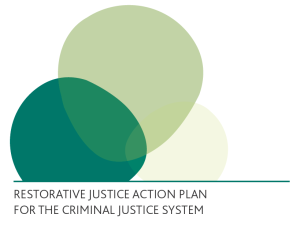 The Restorative Justice Council in the UK published this significant bit of news this week:
The Restorative Justice Council in the UK published this significant bit of news this week:
The Ministry of Justice set out a strategy to build access, capacity and awareness of restorative justice across the Criminal Justice System, in a Restorative Justice Action Plan, published today at the start of International Restorative Justice Week.
A recent Joint Justice Inspectorates report found that restorative justice in the UK is limited by 'patchy' availability across the country, gaps in access across the stages of the justice system and inconsistent quality of restorative justice being delivered. This action plan aims to tackle these limitations.
The action plan, which can be downloaded here, begins with this statement from Jeremy Wright MP, Parliamentary Under-Secretary of State, Minister for Prisons and Rehabilitation:
For many victims, seeing the perpetrator punished for their crime helps to bring closure, enabling them to get on with their lives. For others, the judicial process is not enough. Rather than relief, victims may feel frustrated that they were not able to describe the hurt, stress and anxiety caused by the crime to the one individual who needed to hear it most; the offender.
Restorative justice can help in this respect. It can take the form of a face to face meeting between the victim and the offender, or a group conference involving members of the community, who have been affected by a particular crime.
My Department has recently tabled amendments to the Crime and Courts Bill which will give judges explicit powers to defer sentencing to allow restorative justice to take place. It is intended to address the major gap in the use of restorative justice between conviction and sentence.
When the Bill is enacted, restorative justice will then be accessible at every stage of the criminal justice process, from initial arrest through to prison, for those victims and offenders who are willing. [emphasis added]
The action plan is the result of three meetings of a steering group over the past few months. The following summarizes their work:
Our vision is that:
- RJ should operate at scale, with specified standards, and be effective in meeting the needs of victims and offenders
- key standards should be established that enable local areas to develop innovative service delivery models
- RJ should be integrated with other interventions e.g. drug treatment, housing, employment support
- RJ should only be used when appropriate to suit the needs of victim and offender
The action plan will address this through:
- Access – providing timely, high-quality and easy access to RJ
- Awareness – making the public and CJS [criminal justice system] practitioners aware of RJ as an option
- Capacity – making skilled RJ facilitators available nationally
- Evidence – understanding the impact on victims, offenders and the community
It will be fascinating to see how the UK continues to take the lead in terms of both embedding restorative justice throughout its criminal justice system and striving to maintain the quality of the services offered.

